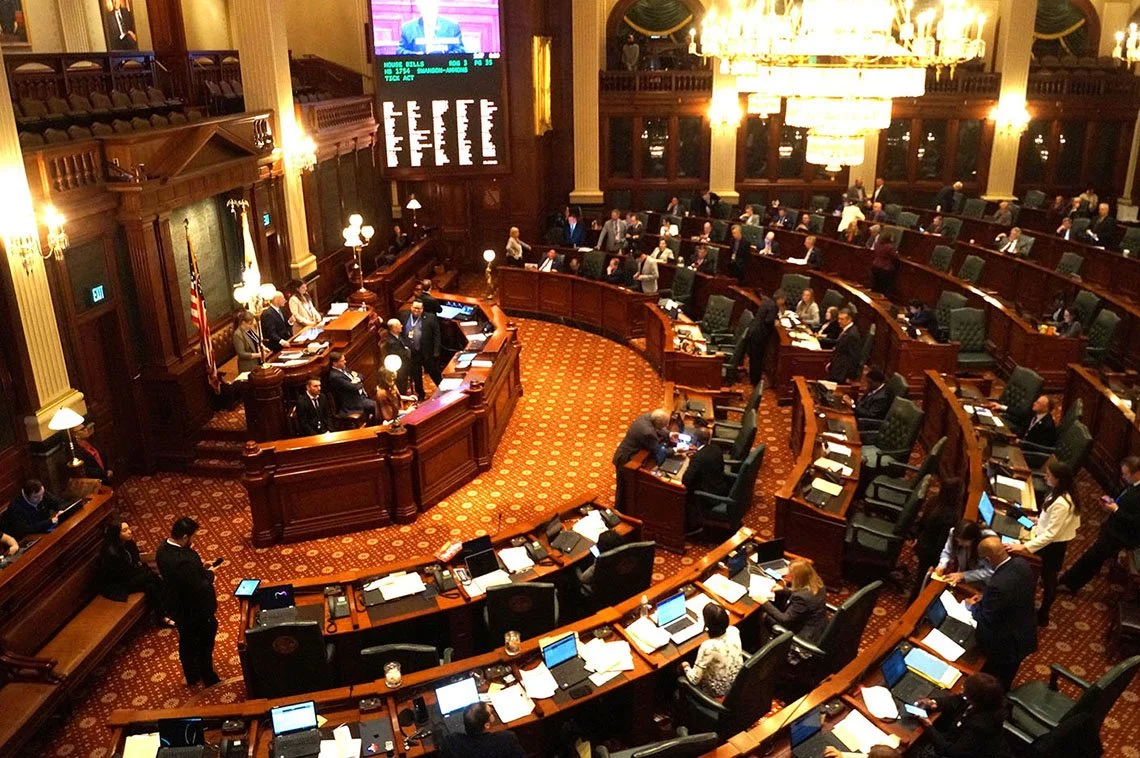Bill requires some K-12 schools to pick new mascots, team names, logos
By BRIDGETTE FOX
Capitol News Illinois
bfox@capitolnewsillinois.com
SPRINGFIELD – Illinois K-12 schools may soon be required to pick new mascots to replace those that reference Native American names and imagery.
That would include logos, team names and mascots which 90 schools throughout the state use, such as the Mt. Zion Braves or the Cahokia Comanches, according to legislators.
House Bill 1237 passed in the House on Thursday with a vote of 71-40.
The bill points out specific mascots and names like “Redskins, Braves, Chiefs, Chieftains, Tribe, Indians, or any synonymous term” as those being banned. It also applies to logos with Native American feathered headdresses or traditionally Native American weapons, especially if combined with feathers.
If signed into law, schools would have to have a new mascot chosen by July 1, 2026. Other big changes, that would cost schools money, have a slightly longer delay.
Instead of requiring schools to buy new athletic uniforms and other school materials with new iconography as soon as the bill passes, schools could keep using those old materials until Sept. 1, 2030, as long as the new names and logo designs have been picked out.
There is also an exception for any school whose mascot has a direct tie with a federally recognized tribe and the school gets permission from that tribe to continue using the mascot. That consent would have to be renewed every five years, according to the bill.
This isn’t the first year the bill’s main sponsor, Rep. Maurice West, D-Rockford, has tried to pass the Native mascot ban.
When West tried in 2020, members of the Native American Chamber of Commerce of Illinois asked him to push for teaching Native American history in schools first.
That education bill didn’t make it into law until 2023.
Read more: Bill requiring schools to teach Native American history heads to Senate floor
“This is about the welfare and benefit of our students. It's about not harming our students,” said Andrew Johnson, executive director of NACCI, during a March 20 committee hearing. “It's also not about polls, popularity, contests, anecdotes, tradition, honor, DEI, wokeness or political correctness.”
Advocates said they wanted to focus on K-12 schools because they can choose not to be fans of professional sports teams like the Chicago Blackhawks of the NHL, but they can’t choose not to send their children to school.
This bill also does not apply to universities.
Educators and representatives said the bill would minimize children’s exposure in school to stereotypes about Native Americans.
“At one point, native mascots and logos were the most widespread education about native people in our state,” said Megan Bang, a professor at Northwestern University, during a committee hearing. “This year is our first time as a state to require teaching about native people.”
Read more: Pritzker signs bills expanding protections for Native Americans
“The contradictions of both having educators teach about real Native people, but continue to perpetuate stereotyped images, sets up for educators to have harder times with young people, and sets in motion contradictory learning objectives for young people as well,” Bang said.
When the bill was discussed on the House floor, Republicans were united against the bill in their votes after they came back from an hour-long meeting they took during the bill’s debate.
“If there's bad actors, absolutely let's get rid of them. And I will also just leave you with this question,” Travis Weaver, R-Edwards, said. “This group of people were oppressed, but is oppressed and forgotten better?”
Aaron Golding, member of the Seneca Nation Beaver Clan and member of the Chicago American Indian Community Collaborative, said in March that Native Americans’ input and concerns are often dismissed.
“Our voices and expertise on these issues are ignored,” Golding said. “See, when people are taught about our history prior to 1900 only, without an understanding of our contemporary experiences over the most recent 125 years – and ‘recent’ is pretty loosely said there – it's easy to dismiss us as ghosts of the past whose needs don't matter today.”
The bill now moves to the Senate for consideration.
Capitol News Illinois is a nonprofit, nonpartisan news service that distributes state government coverage to hundreds of news outlets statewide. It is funded primarily by the Illinois Press Foundation and the Robert R. McCormick Foundation.







